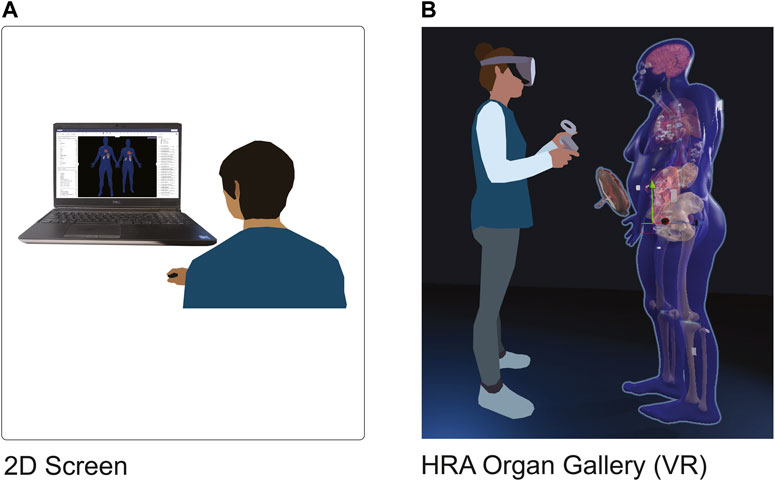Source: https://www.doi.org/10.3389/fbinf.2023.1162723
Welcome to this repo! The Human Reference Atlas (HRA) Organ Gallery (https://humanatlas.io/vr-organ-gallery) lets the user explore 65 human organs and 800+ of tissue blocks (as of the HRA v2.1), presented in real-world size and 3D. The organ models were developed to map trillions of cells for the Human BioMolecular Atlas Program (HuBMAP), the Cellular Senescence Network (SenNet), and similar efforts.
To download the most up to date GLB files for the organs of the HRA, please visit the HRA 3D Reference Object Library.
If you would like to become a test user, please download the application at https://www.meta.com/experiences/5696814507101529/. Information for testers can be found here. A paper describing the concept of the application is available here.
For more information about the Common Coordinate Framework (CCF) used to map tissue blocks from 800+ of donors to single reference organs (as of HRA v2.1), see the Human Reference Atlas Portal at https://humanatlas.io/.
See the Changelog for the latest developments.
This software is developed by Andreas Bueckle and his team at the Cyberinfrastructure for Network Science Center at Indiana University.
Schlehlein, Heidi, Bruce W. Herr II, Ellen M. Quardokus, Andreas Bueckle, and Katy Börner. 2023. HuBMAP CCF 3D Reference Object Library. Accessed June 1, 2023
Anatomical data from the National Library of Medicine’s Visible Human Project. https://www.nlm.nih.gov/databases/download/vhp.html
V. Spitzer, M. J. Ackerman, A. L. Scherzinger, and D. Whitlock, "The visible human male: a technical report," (in eng), Journal of the American Medical Informatics Association, vol. 3, no. 2, pp. 118-130, Mar-Apr 1996, doi: 10.1136/jamia.1996.96236280.
To access all Visible Human Massive Open Online (VHMOOC) materials, register for free at https://expand.iu.edu/browse/sice/cns/courses/hubmap-visible-human-mooc.
A. Bueckle, C. Qing, S. Luley, Y. Kumar, N. Pandey, and K. Börner, “The HRA Organ Gallery affords immersive superpowers for building and exploring the Human Reference Atlas with virtual reality,” Frontiers in Bioinformatics, vol. 3, 2023. doi: 10.3389/fbinf.2023.1162723
K. Börner, A. Bueckle, et al., “Tissue Registration and Exploration User Interfaces in support of a Human Reference Atlas,” Nature Communications Biology, 2022. doi: 10.1038/s42003-022-03644-x
K. Börner et al., "Anatomical structures, cell types and biomarkers of the Human Reference Atlas," Nature Cell Biology, vol. 23, no. 11, pp. 1117-1128, 2021/11/01 2021, doi: 10.1038/s41556-021-00788-6.
M. P. Snyder et al., "The human body at cellular resolution: the NIH Human Biomolecular Atlas Program," Nature, vol. 574, no. 7777, pp. 187-192, 2019/10/01 2019, doi: 10.1038/s41586-019-1629-x
Cyberinfrastructure for Network Science Center. "Registration User Interface." https://apps.humanatlas.io/rui (accessed Jan 11, 2023).
Cyberinfrastructure for Network Science Center. "Exploration User Interface." https://apps.humanatlas.io/eui/ (accessed Jan 11, 2023).
